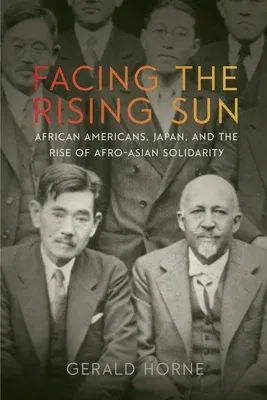The surprising alliance between Japan and pro-Tokyo African Americans
during World War II
In November 1942 in East St. Louis, Illinois a group of African
Americans engaged in military drills were eagerly awaiting a Japanese
invasion of the U.S.-- an invasion that they planned to join. Since the
rise of Japan as a superpower less than a century earlier, African
Americans across class and ideological lines had saluted the Asian
nation, not least because they thought its very existence undermined the
pervasive notion of "white supremacy." The list of supporters included
Booker T. Washington, Marcus Garvey, and particularly W.E.B. Du Bois.
Facing the Rising Sun tells the story of the widespread pro-Tokyo
sentiment among African Americans during World War II, arguing that the
solidarity between the two groups was significantly corrosive to the
U.S. war effort. Gerald Horne demonstrates that Black Nationalists of
various stripes were the vanguard of this trend--including followers of
Garvey and the precursor of the Nation of Islam. Indeed, many of them
called themselves "Asiatic", not African. Following World War II,
Japanese-influenced "Afro-Asian" solidarity did not die, but rather
foreshadowed Dr. Martin Luther King's tie to Gandhi's India and Black
Nationalists' post-1970s fascination with Maoist China and Ho's Vietnam.
Based upon exhaustive research, including the trial transcripts of the
pro-Tokyo African Americans who were tried during the war, congressional
archives and records of the Negro press, this book also provides
essential background for what many analysts consider the coming "Asian
Century." An insightful glimpse into the Black Nationalists' struggle
for global leverage and new allies, Facing the Rising Sun provides a
complex, holistic perspective on a painful period in African American
history, and a unique glimpse into the meaning of "the enemy of my enemy
is my friend."

